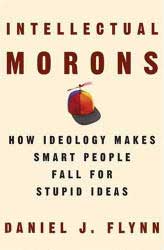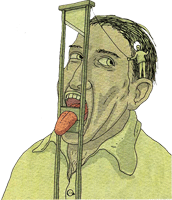|
|
It can help to think of ideologies as convincing but false ways of viewing the world. Beliefs and ideas that are ideologies combine to create for each of us a similar 'world view'. This has been described, some would say overly simplistically, as a kind of false consciousness.
Ideologies act to create a framework that guides our thoughts and actions in ways that align us with the ways others in our group, society or culture think and act. It is because everyone else thinks and acts in ideologically similar ways that ideologies - if we ever think of them at all - seem so utterly just, right, common sense or natural.
- Whenever we have ideas or beliefs that seem too obvious to question, we are almost certainly thinking ideologically.
|
FREEDOM?
|
Where ideologies become especially interesting is that they form a world view that can be shown to support and reinforce what is called society's status quo. That is, ideologies can be shown to act to reinforce and maintain our society's existing social structure with its vast power and wealth differentials. This is why some people think of ideologies as political and deceptive devices - as a kind of 'false consciousness'.
- All ideologies can be argued to work like this - but it can be difficult to make the link from the ideology to the reinforcement of our society's structure.
There are certainly many ideologies. They concern such central aspects of life as freedom, gender, the roles of men and women, of the family, of the right to own goods and wealth, of who should hold power over others (parents, managers, politicians... etc.), etc.
- These ideological ways of thinking all appear too obvious to consider. Ideologies both hide themselves and 'make disappear' many realities and aspects of life. For example, is the 'third world' a reality... or an ideology. Think about that one and you will begin to see why for many, ideologies are an important area to study.
The 19th century philosopher, Karl Marx, felt that, over time, all societies would progress either naturally - or by revolution - towards a better, more enlightened state of social equality. Marx felt that capitalism was a step on an evolutionary ladder towards a future ideal society: a society in which co-operation rather than competition prevailed. He called this a communist society.
|
One way to uncover an ideology is to consider what kind of actions would bring shame onto you within your family, group of friends or society. If you can see that things in themselves can have no natural or inherent shame attached to them - and that only thinking can make this so - then you can see that the cause of this shame must be ideological.
|


